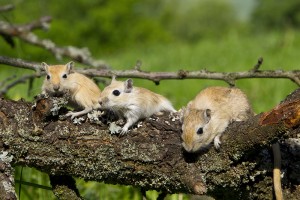Plague Spread By Giant Gerbils?
Tuesday, February 24th, 2015February 24, 2015

Scientists believe that gerbils may have spread the deadly plague known as the Black Death. (Credit: © Bildagentur Zoonar GmbH/Shutterstock)
Scientists from the University of Oslo report that a series of outbreaks of plague, called the Black Death, which swept across Europe and Asia beginning in the mid-1300′s, may have been spread by gerbils rather than rats. The great gerbil (Rhombomys opimus) is native to Central Asia, where the Black Death originated.
Scientists have long believed that plague was spread to Europe by the black rat (Rattus rattus). The theory was that black rats traveled on ships from Central Asia. The rats carried the bacteria responsible for plague, Yersinia pestis, and once the rats arrived in Europe or Asia, fleas carried the bacteria from rats to people. Scientists theorized that rats living in Europe then acted as a reservoir for the Yersinia bacteria, resulting in later outbreaks of plague.
However, in a paper published this week in the Proceedings of the National Academy of Sciences, scholars claim that when they studied the dates, there was no correlation (relationship) between times in which weather conditions were good for rats and outbreaks of Black Death in Europe. When the scientists studied weather and conditions in Central Asia, however, there was a correlation between times that would have been good for great gerbils (warm and wet weather) and outbreaks of plague in Europe several years later. The scientists believe that when gerbils had a population boom in Central Asia, they may have carried the disease by the land and sea routes to Europe, and the fleas they carried passed the disease on to humans. Thus, the outbreaks in Europe were due to individual instances of transmission by gerbils, rather than a persistence of the disease in the rats.
Genetic studies of the plague bacteria should be able to determine whether the disease came to Europe once, and lay dormant in rats, or whether it was transmitted many times, and by gerbils. Until then, it seems as if we may have unfairly blamed the rat.
Other World Book articles:


